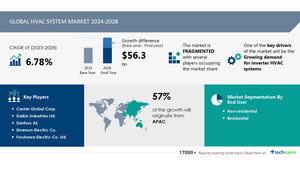NEW YORK, July 16, 2024 /PRNewswire/ -- The global processed vegetable market size is estimated to grow by USD 89.9 billion from 2024-2028, according to Technavio. The market is estimated to grow at a CAGR of over 11.04% during the forecast period. Increasing demand for processed vegetables is driving market growth, with a trend towards processed vegetable manufacturers and distributors venturing into private-label marketplace. However, threat from unorganized players and intense competition among vendors poses a challenge. Key market players include Amazon.com Inc., Archer Daniels Midland Co., Ardo Coordination Center NV, B and G Foods Inc., Charoen Pokphand Foods PCL, Conagra Brands Inc., Cooperatie Koninklijke Cosun UA, Dole plc, Farmers Market Foods Inc., J.D. Irving Ltd., Libbys Brand Holding, Mitsubishi Corp., Ninos Fresh Cut Fruit and Veg LLC, NutriAsia Inc., Del Monte Pacific Ltd., Seneca Foods Corp., Smith Frozen Foods Inc., Sprouts Farmers Market Inc., Sysco Corp., and The Fresh Gourmet Co..
Get a detailed analysis on regions, market segments, customer landscape, and companies- View the snapshot of this report
Processed Vegetable Market Scope |
|
Report Coverage |
Details |
Base year |
2023 |
Historic period |
2018 - 2022 |
Forecast period |
2024-2028 |
Growth momentum & CAGR |
Accelerate at a CAGR of 11.04% |
Market growth 2024-2028 |
USD 89.9 billion |
Market structure |
Fragmented |
YoY growth 2022-2023 (%) |
9.65 |
Regional analysis |
APAC, North America, Europe, South America, and Middle East and Africa |
Performing market contribution |
APAC at 36% |
Key countries |
US, China, UK, Germany, and India |
Key companies profiled |
Amazon.com Inc., Archer Daniels Midland Co., Ardo Coordination Center NV, B and G Foods Inc., Charoen Pokphand Foods PCL, Conagra Brands Inc., Cooperatie Koninklijke Cosun UA, Dole plc, Farmers Market Foods Inc., J.D. Irving Ltd., Libbys Brand Holding, Mitsubishi Corp., Ninos Fresh Cut Fruit and Veg LLC, NutriAsia Inc., Del Monte Pacific Ltd., Seneca Foods Corp., Smith Frozen Foods Inc., Sprouts Farmers Market Inc., Sysco Corp., and The Fresh Gourmet Co. |
Market Driver
Private-label brands are experiencing notable growth in the global retail market due to competitive pricing and ease of access to food and beverages. Major players, such as Whole Foods Market Inc. (a subsidiary of Amazon) and Sysco, have expanded their product offerings by introducing private-label brands. For instance, Sysco sells a variety of processed vegetables under its FreshPoint brand in North America, while Whole Foods offers a range of private-label processed vegetables under its 365 Everyday Value brand. Key offerings include Organic Cut Green Beans, Sliced Beets, and Hearts of Palm (Salad Cut). The perceived high quality and lower price are expected to fuel the sale of these private-label processed vegetables in the global market, contributing to its significant growth during the forecast period.
The processed vegetable market is witnessing significant growth due to increasing urbanization and consumer preferences for convenience. Canning, drying, and juice preparation are popular methods used to create value-added products. Consumers value the longer shelf life and natural taste of these processed vegetables, which offer health benefits including minerals, protein, fiber, and vitamins. Modernization and convenience factors are driving the demand for processed vegetables. Canning and heat treatment help preserve natural properties, while additives are used sparingly to enhance flavor. Organic and natural fresh products are also gaining popularity in the market. Frozen and portability are key factors in the convenience of processed vegetables. Supermarkets and hypermarkets dominate the product distribution, but online retailing and e-commerce are growing in popularity. Daily diet staples like canned vegetables and juice are popular, with product diversity increasing to cater to various tastes and preferences. Despite the benefits, processed vegetables face criticism for reduced natural properties. However, the market continues to grow, with consumers prioritizing the health benefits and convenience over the slight reduction in natural properties. The market is expected to remain competitive, with agriculture playing a crucial role in supplying raw materials.
Discover 360° analysis of this market. For complete information, schedule your consultation - Book Here!
Market Challenges
- The processed vegetable market is currently facing significant challenges from unorganized players, particularly in major producing and exporting countries like China and India. Unorganized cottage-scale industries dominate these markets, making it difficult for organized vendors to compete. The market is highly competitive with numerous global and regional players, distributors, and private-label vendors. The high demand for processed vegetables encourages new entrants, increasing competition. The fragmented market structure poses challenges in implementing standardization and integration of technologies. Distributors and private-label vendors often outsource production to third-party manufacturers due to the difficulty of maintaining standardized manufacturing technology. These factors, including the threat from unorganized players and intense competition, may hinder the growth of the global processed vegetable market.
- The processed vegetable market faces several challenges in providing value-added products with natural taste and health benefits while maintaining convenience. Reduced natural properties due to heat treatment, additives, and shelf life concerns are major hurdles. The cold market for organic, natural fresh products competes fiercely with frozen and canned vegetables. Convenience foods catering to busy lifestyles and increased disposable incomes have led to the popularity of processed vegetables in supermarkets and hypermarkets. However, the shift to online retailing and e-commerce platforms poses new challenges. Import-export analysis is crucial for revenue pockets, especially in regions with high agriculture productivity. Equipment cost and competition from unorganized players in the industry are ongoing concerns. Product diversity, including juices, ready-to-eat formats, and fresh-cut vegetables, is essential to cater to daily diet preferences. Overall, the processed vegetable market requires continuous innovation to meet consumer demands while maintaining natural flavors and ingredients, reducing costs, and ensuring product distribution through various channels.
For more insights on driver and challenges - Request a sample report!
Segment Overview
This processed vegetable market report extensively covers market segmentation by
- Product
- 1.1 Canned vegetables
- 1.2 Frozen vegetables
- 1.3 Fresh-cut vegetables
- Distribution Channel
- 2.1 Hypermarkets and supermarkets
- 2.2 Independent retailers and convenience store
- 2.3 Speciality food stores
- 2.4 Online retailers
- Geography
- 3.1 APAC
- 3.2 North America
- 3.3 Europe
- 3.4 South America
- 3.5 Middle East and Africa
1.1 Canned vegetables- The processed vegetable market is a significant sector in the food industry. Companies produce and sell a variety of vegetables that have undergone some form of processing, such as canning, freezing, or dehydration. Consumers value the convenience and extended shelf life these products offer. Market size and growth depend on factors like production costs, consumer preferences, and competition from fresh produce and other processed foods. Companies focus on innovation, sustainability, and cost-effective production methods to stay competitive.
For more information on market segmentation with geographical analysis including forecast (2024-2028) and historic data (2017-2021) - Download a Sample Report
Learn and explore more about Technavio's in-depth research reports
The global market for fruit and vegetable mixed juices is experiencing robust growth, driven by rising health consciousness and demand for convenient nutrition. Consumers are increasingly opting for natural, vitamin-rich beverages that offer a blend of flavors and health benefits. Key players are innovating with organic ingredients and functional additives to cater to diverse tastes and health preferences.
The global canned food market continues to expand, fueled by convenience, longer shelf life, and busy lifestyles. Canned foods offer convenience without compromising on nutrition, making them popular among urban consumers. Growth is also driven by innovations in packaging and preservation techniques, ensuring quality and freshness. Key segments include fruits, vegetables, soups, and seafood, with sustainable practices gaining traction among manufacturers.
Research Analysis
The processed vegetable market caters to the increasing demand for convenient and nutritious food options among consumers. With the trend of modernisation and urbanisation, the market for processed vegetables has seen significant growth. Heat treatment and the addition of natural ingredients like minerals, protein, fibre, vitamins, and minerals have made these products an essential part of daily diets. Consumers prefer processed vegetables for their portability, long shelf life, and ease of use. Supermarkets and hypermarkets are major distribution channels, but online retailing and e-commerce platforms are also gaining popularity. The market offers a wide range of products, including frozen vegetables, canned vegetables, juice, and convenience foods. Busy lifestyles and disposable incomes have led to an increase in demand for processed vegetables. However, the market also faces challenges such as the reduction in the consumption of natural fresh products and the rise in imports. Product diversity remains a key focus area, with organic and natural processed vegetables gaining popularity.
Market Research Overview
The processed vegetable market caters to the increasing demand for convenient and nutritious food options among consumers. Vegetables, rich in minerals, protein, fiber, vitamins, and other essential nutrients, undergo various processing techniques such as canning, flavoring, drying, and juice preparation to enhance their shelf life and convenience. Modernization and urbanization have fueled the popularity of processed vegetables, offering natural taste and health benefits. Canning, a common method, retains vegetable's natural properties while extending their shelf life. Heat treatment and the addition of additives are essential in this process. Value-added products like frozen, portability, and ready-to-eat formats cater to busy lifestyles and disposable incomes. The market includes organic and natural fresh products, with convenience foods gaining traction. Supermarkets, hypermarkets, online retailing, and e-commerce platforms are significant distribution channels. Agriculture plays a crucial role in the supply chain, with imports and exports playing a role in product distribution. Despite the convenience and health benefits, processed vegetables face criticism for reduced natural properties. Product diversity, including juices, canned vegetables, and fresh-cut vegetables, is a key revenue pocket. Equipment costs and competition from unorganized players are challenges. Import-export analysis and revenue pockets offer growth opportunities.
Table of Contents:
1 Executive Summary
2 Market Landscape
3 Market Sizing
4 Historic Market Size
5 Five Forces Analysis
6 Market Segmentation
- Product
- Canned Vegetables
- Frozen Vegetables
- Fresh-cut Vegetables
- Distribution Channel
- Hypermarkets And Supermarkets
- Independent Retailers And Convenience Store
- Speciality Food Stores
- Online Retailers
- Geography
- APAC
- North America
- Europe
- South America
- Middle East And Africa
7 Customer Landscape
8 Geographic Landscape
9 Drivers, Challenges, and Trends
10 Company Landscape
11 Company Analysis
12 Appendix
About Technavio
Technavio is a leading global technology research and advisory company. Their research and analysis focuses on emerging market trends and provides actionable insights to help businesses identify market opportunities and develop effective strategies to optimize their market positions.
With over 500 specialized analysts, Technavio's report library consists of more than 17,000 reports and counting, covering 800 technologies, spanning across 50 countries. Their client base consists of enterprises of all sizes, including more than 100 Fortune 500 companies. This growing client base relies on Technavio's comprehensive coverage, extensive research, and actionable market insights to identify opportunities in existing and potential markets and assess their competitive positions within changing market scenarios.
Contacts
Technavio Research
Jesse Maida
Media & Marketing Executive
US: +1 844 364 1100
UK: +44 203 893 3200
Email: [email protected]
Website: www.technavio.com/
SOURCE Technavio

WANT YOUR COMPANY'S NEWS FEATURED ON PRNEWSWIRE.COM?
Newsrooms &
Influencers
Digital Media
Outlets
Journalists
Opted In




Share this article